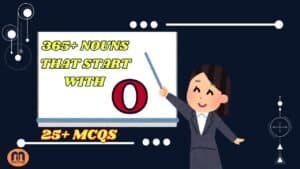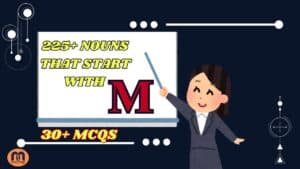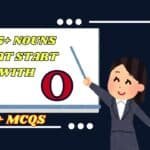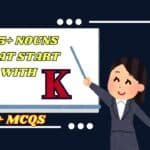Verbs That Start With M: Language is a powerful tool that shapes our thoughts, actions, and communications.
Verbs, as the engine of any sentence, are essential in conveying action, states, and occurrences. Whether you’re crafting a novel, improving your writing, or simply expanding your vocabulary, knowing a wide variety of verbs is crucial.
In this article, we’ll explore 299+ verbs that start with the letter “M”, offering insight into their meanings, uses, and how they can help you communicate more effectively.
Why Focus on Verbs Starting with M?
The letter M is rich with action-packed verbs that can add color, depth, and variety to your sentences. By understanding how to incorporate these verbs, you can elevate your writing and conversation.
Whether you’re a writer, student, or language enthusiast, mastering these verbs will equip you with more dynamic tools for expression.
Let’s dive into some M-words that can help you master the art of communication.
Common Verbs Starting with M
These verbs are widely used in everyday conversations and formal writing. They encompass a range of actions, from physical movements to intellectual pursuits.
Movement & Action Verbs: Expressing Motion and Activity
Movement and action verbs are essential for describing physical activity, movement, and changes in states. These verbs help paint vivid pictures and add energy to your sentences.
- Maneuver: To move skillfully, often in tight or complex spaces.
- March: To walk with a steady, deliberate pace.
- Move: To change position or go from one place to another.
- Migrate: To move from one region or habitat to another.
- Mount: To climb onto something, such as a horse or bicycle.
- Murder: To kill someone intentionally and unlawfully.
- Mangle: To badly damage or mutilate something.
- Magnify: To make something appear larger or more important.
- Mow: To cut down grass or plants with a mower.
- Mimic: To imitate or copy someone’s actions or behavior.
- Melt: To turn from a solid into a liquid, often due to heat.
- Miss: To fail to hit, reach, or achieve something.
- Mourn: To express sorrow for someone’s death.
- Manage: To oversee or control something or someone.
- Magnify: To make something larger or more significant.
- Migrate: To move or travel from one region to another, usually seasonally.
- Mound: To heap up or pile something into a mound or stack.
- Mock: To imitate in a way that is intended to mock or ridicule.
- Maneuver: To move something or someone with skill, often to gain an advantage.
- Monopolize: To control something in such a way that others cannot compete.
- Mast: To erect a pole or structure.
- Mangle: To injure or damage something severely.
- Minimize: To reduce something to the smallest possible amount or degree.
- Multiply: To increase in number, often rapidly.
- Mimic: To imitate closely.
- Mince: To cut or chop something into very small pieces.
- Moor: To tie or anchor a boat to a dock.
- Mediate: To act as an intermediary in a dispute to bring about agreement.
- Mash: To crush or squeeze something, often food, into a soft mass.
- Mend: To repair or fix something.
- Migrate: To travel from one region or habitat to another, typically seasonally.
- Mound: To create a small heap or pile of something.
- Monopolize: To control something in a way that limits or prevents others from using it.
- Mop: To clean or wash a surface with a mop.
- Mock: To imitate someone or something in a humorous or unkind way.
- Merge: To combine or unite things together.
- Mop: To clean a surface with a mop.
- Mock: To mimic in a mocking or derisive way.
- Mend: To fix or repair something that is damaged.
- Mash: To crush or press something into a soft or pulpy mass.
Mental & Cognitive Verbs: Thinking and Perception
Mental and cognitive verbs help us express thoughts, perceptions, decisions, and mental processes. These verbs allow you to communicate how we think, feel, or make sense of the world.
- Meditate: To think deeply or reflect upon something, often for relaxation or focus.
- Mull: To think about something deeply over a period of time.
- Mimic: To imitate or copy someone’s actions, behaviors, or thoughts.
- Mind: To be concerned about something or someone.
- Mature: To develop mentally or emotionally to full maturity.
- Meditate: To engage in contemplation or deep thought.
- Master: To gain control or mastery over something.
- Muster: To gather or summon up something, such as courage or resources.
- Mourn: To feel or express sorrow for a loss or death.
- Mull: To reflect or consider something deeply, often before making a decision.
- Mentor: To guide and support someone in their personal or professional development.
- Monitor: To observe or keep track of something over time.
- Muddle: To confuse or make something unclear.
- Mimic: To imitate the behavior or thoughts of another.
- Mend: To restore or repair something that has been damaged or broken.
- Meditate: To focus the mind on something, often for relaxation or spiritual purposes.
- Mourn: To feel or express sorrow or grief for something or someone.
- Mull: To reflect or contemplate deeply on a subject or situation.
- Mimic: To imitate or copy someone’s actions, often for amusement or mockery.
- Muster: To gather together, especially courage or strength.
- Mentor: To provide guidance or advice to someone, often in a professional or personal capacity.
- Monitor: To keep track of, observe, or oversee something over a period of time.
- Mature: To reach full development or perfection, especially in a mental or emotional sense.
- Mold: To influence the development or shaping of something.
- Meditate: To engage in deep thought, often for relaxation or reflection.
- Map: To chart or plan out something, often mentally.
- Mull: To consider something carefully over time.
- Mature: To evolve into a fully developed or thoughtful state.
- Mimic: To repeat someone’s actions or words in an imitative manner.
- Mend: To fix, repair, or heal something mentally or emotionally.
- Monitor: To watch and assess something continuously over a period of time.
- Muster: To call together or summon up resources or strength.
- Mourn: To grieve or express sadness for someone or something lost.
- Meditate: To engage in mindful, intentional thought or contemplation.
- Mature: To develop or evolve into a more complex or sophisticated form.
- Mentor: To offer guidance, advice, or support to someone, typically a younger person.
Communication Verbs: Expressing Thoughts and Ideas
Communication verbs are crucial for conveying information, whether it’s through speaking, writing, or other forms of expression. These verbs help in making our interactions clear, concise, and impactful.
- Mention: To briefly refer to something in speech or writing.
- Mumble: To speak in a low or unclear manner.
- Mock: To imitate in a way that ridicules or makes fun of someone.
- Murmur: To speak softly and indistinctly.
- Mediate: To intervene in a discussion or conflict in order to help resolve it.
- Motivate: To encourage or inspire someone to take action.
- Monologue: To deliver a long, uninterrupted speech.
- Message: To communicate information or thoughts through a medium.
- Mobilize: To organize or prepare for action, often in response to an event or situation.
- Mimic: To copy the speech or actions of someone.
- Meditate: To deeply consider or think about a situation or idea.
- Mute: To silence or make something less audible.
- Mutter: To speak in a low, barely audible voice, often in frustration or discomfort.
- Magnify: To emphasize or exaggerate something in speech or writing.
- Meld: To combine or merge different ideas, thoughts, or objects into one.
- Misinterpret: To understand something incorrectly, leading to misunderstanding.
- Mock: To ridicule or imitate in a manner that makes fun of someone or something.
- Mimic: To copy someone’s speech, actions, or mannerisms, often for comedic effect.
- Mislead: To give someone false or incorrect information, leading them to form a wrong belief or understanding.
- Mention: To refer to something briefly in conversation or writing.
- Mend: To repair or fix something, often used in the context of relationships or emotional connections.
- Mollify: To calm or soothe someone’s anger or emotion.
- Muster: To gather or collect something, often courage or energy.
- Meditate: To engage in deep, reflective thought, often leading to clarity or peace.
- Minimize: To reduce the importance or significance of something in conversation.
- Meld: To blend or combine multiple things together smoothly, often in ideas or concepts.
- Monitor: To observe or keep track of something or someone over time.
- Mutter: To speak in a low, unintelligible manner, often expressing dissatisfaction.
- Mobilize: To organize or prepare for action, often in response to a call or need.
- Mingle: To engage in social interaction with others, often casually.
- Misspeak: To say something incorrectly or to make an error in speech.
- Mimic: To imitate someone’s mannerisms, voice, or behavior.
- Murmur: To speak in a low voice, often to express intimacy or secrecy.
- Moot: To raise an issue for discussion or debate, often to clarify or resolve it.
- Murder: To speak or act in a way that is forcefully negative or damaging.
- Meditate: To give deep thought or consideration to something, often related to personal reflection.
Descriptive Verbs: How to Add Color to Your Writing
Verbs that describe emotions, states, and qualities can enhance your writing. These words allow you to communicate more vividly and with greater nuance.
Verbs for Describing Emotional States:
- Mourn: To feel or express sorrow or grief.
- Marvel: To be filled with wonder or astonishment.
- Melt: To lose shape due to heat or to soften emotionally.
- Meditate: To engage in deep thought, often in an emotional context.
- Mimic: To copy or simulate emotions or actions.
Verbs for Qualities and States:
- Magnify: To make something appear larger or more important than it really is.
- Maintain: To keep something in good condition or to assert something firmly.
- Mature: To grow or develop to a point of full functionality.
- Mend: To repair or restore something to a better state.
- Multiply: To increase in number or size.
Action-Packed Verbs: For a Dynamic, Engaging Tone
Action-packed verbs provide energy and movement, making your writing and speech more dynamic. Whether describing physical motion or dramatic events, these verbs help create an intense atmosphere and keep readers engaged.
- Mangle
- March
- Move
- Mount
- Murder
- Mow
- Mimic
- Melt
- Miss
- Maneuver
- Magnify
- Mound
- Magnetize
- Mediate
- Mobilize
- Monopolize
- Misfire
- Molt
- Masticate
- Mask
- Marvel
- Mess
- Motivate
- Mangle
- Maneuver
- Meditate
- Map
- Maim
- Mesmerize
- Murmur
- Marinate
- Motivate
- March
- Magnify
- Milk
- Monitor
- Modify
- Molest
- Mock
- Mask
- Minimize
- Marvel
- Mull
- Mince
- Manage
- Mend
- Mold
- Mound
- Mentor
- Mediate
- Muddle
- Mutate
- Magnify
- Mind
- Maul
- Misspeak
- Muffle
- Maintain
- Muster
- Mandate
- Migrate
- Model
- Mediate
- Mobilize
- Move
- Motivate
- Motivate
- Manipulate
- Mislead
Verbs for Problem-Solving and Negotiation
In problem-solving and negotiation, it’s crucial to use verbs that emphasize reasoning, discussion, and collaboration. These verbs are perfect for navigating discussions, finding solutions, and making decisions in professional or personal contexts.
- Mediate
- Monitor
- Manage
- Motivate
- Minimize
- Modify
- Muster
- Mend
- Mediate
- Motivate
- Measure
- Match
- Mold
- Mix
- Meditate
- Motivate
- Motivate
- Mind
- Maintain
- Manage
- Mentor
- Move
- Mobilize
- Manage
- Modify
- Migrate
- Mediate
- Meld
- Merge
- Motivate
- Minimize
- Mold
- Match
- Mentor
- Migrate
- Moderate
- Manage
- Muster
- Mediate
- Mediate
- Mobilize
- Manage
- Move
- Modify
- Mobilize
- Motivate
- Monitor
- Map
- Mobilize
- Motivate
- Mobilize
- Manage
- Merge
- Mend
- Modify
- Migrate
- Match
- Mentor
- Mellow
- Mull
- Mandate
- Muster
- Mediate
- Mediate
- Measure
- Match
- Mend
- Mobilize
- Mediate
- Mobilize
- Move
- Manage
- Migrate
- Mediate
- Modify
Fun and Uncommon Verbs to Expand Your Vocabulary
Uncommon verbs add flair and nuance to your language, providing new ways to express thoughts and actions. These verbs can make your writing more colorful, engaging, and specific, offering depth and interest.
- Muddle
- Meander
- Misappropriate
- Macerate
- Mellow
- Migrate
- Mend
- Mendicant
- Malign
- Masticate
- Maneuver
- Molt
- Mourn
- Marinate
- Mimic
- Mast
- Meander
- Motivate
- Mangle
- Monopolize
- Mastermind
- Mistrust
- Misstep
- Molest
- Mollify
- Muddle
- Mince
- Mislead
- Mourn
- Mantle
- Mask
- Manipulate
- Meditate
- Mobilize
- Magnify
- Mummify
- Match
- Meditate
- Maneuver
- Mope
- Mentor
- Monologue
- Mellow
- Monitor
- Maul
- Marvel
- Magnify
- Maul
- Mistrust
- Mock
- Mellow
- Migrate
- Motivate
- Merge
- Meld
- Muffle
- Misfire
- Maim
- Migrate
- Mimic
- Mediate
- Mobilize
- Model
- Manage
- Muddle
- Migrate
- Mingle
- Mist
- Mentor
- Mock
- Murk
- Meander
- Meditate
- Mourn
- Mask
- Macerate
How to Integrate M-Verbs into Your Writing
Knowing these verbs is one thing, but how do you actually incorporate them into your writing? Here are a few tips:
- Replace Weak Verbs: Instead of using general verbs like “do” or “go,” try substituting with more specific M-verbs. For example, instead of “go faster,” try “march ahead” or “migrate rapidly.”
- Use Variety: When you find yourself repeating the same verbs, switch them up! This will keep your writing fresh and engaging. For instance, instead of repeatedly using “say,” mix it up with “mutter,” “mention,” or “mimic.”
- Set the Scene: When you’re writing descriptions or setting up a narrative, select verbs that invoke strong images. Instead of saying “the storm came,” say “the storm marched across the horizon.”
- Engage the Reader: Action verbs that start with M can really pump up a narrative. “Murder,” “mutilate,” and “maneuver” can make for thrilling, action-packed scenes.
Conclusion: Unlock Your Language Potential
Learning and incorporating new verbs into your vocabulary is an excellent way to improve your writing and communication.
By mastering 299+ verbs that start with M, you gain a broader toolset to express action, thought, emotion, and description with greater precision.
So, the next time you find yourself searching for the perfect verb, remember these M-words and explore the impact they can have on your sentences. Try replacing a commonly used verb with one of these, and see how much it enhances the richness of your language.
What’s your favorite verb starting with M? Let us know how you plan to use it in your writing today!
MCQs: Verbs That Start With M
1. Which of the following verbs means “to severely damage or mutilate something”?
a) Mimic
b) Mow
c) Mangle
d) Melt
Answer: c) Mangle
2. What does the verb “Migrate” mean?
a) To mock someone
b) To move from one place to another
c) To damage something severely
d) To manipulate an object
Answer: b) To move from one place to another
3. Which verb is used to describe “to imitate or copy someone’s actions”?
a) Mound
b) Manipulate
c) Mimic
d) Mourn
Answer: c) Mimic
4. What is the meaning of “Mobilize”?
a) To sit still
b) To organize and prepare for action
c) To damage something
d) To meditate
Answer: b) To organize and prepare for action
5. The verb “Murder” refers to which of the following?
a) To manipulate someone’s behavior
b) To intentionally kill someone unlawfully
c) To change a substance from solid to liquid
d) To modify something
Answer: b) To intentionally kill someone unlawfully
6. Which verb refers to “to make something appear larger or more significant”?
a) Minimize
b) Magnetize
c) Magnify
d) Meditate
Answer: c) Magnify
7. The verb “Mourn” is best used when describing which action?
a) Celebrating an event
b) Imitating someone’s actions
c) Expressing sorrow for a loss
d) Enhancing the importance of something
Answer: c) Expressing sorrow for a loss
8. What does “Melt” mean?
a) To climb onto something
b) To transition from solid to liquid
c) To manage a group of people
d) To speak softly
Answer: b) To transition from solid to liquid
9. Which verb means “to walk with a firm, regular step, often with purpose”?
a) Mow
b) Mount
c) Migrate
d) March
Answer: d) March
10. The verb “Mimic” can best be used in the following context:
a) Changing your mood
b) Imitating someone’s actions
c) Fixing an object
d) Moving from one place to another
Answer: b) Imitating someone’s actions
11. What does “Mediate” mean in the context of problem-solving?
a) To walk away from a situation
b) To intervene in a conflict to help resolve it
c) To imitate someone’s behavior
d) To alter a substance
Answer: b) To intervene in a conflict to help resolve it
12. Which verb refers to “to create a heap or pile”?
a) Migrate
b) Mound
c) Mend
d) Manipulate
Answer: b) Mound
13. The verb “Muster” means:
a) To gather or summon up resources
b) To manipulate a situation
c) To change position
d) To speak softly
Answer: a) To gather or summon up resources
14. What is the meaning of the verb “Monopolize”?
a) To share with everyone equally
b) To control something in a way that prevents others from participating
c) To imitate someone’s actions
d) To enhance the size of something
Answer: b) To control something in a way that prevents others from participating
15. Which verb means “to fix or repair something”?
a) Mend
b) Mock
c) Mimic
d) Migrate
Answer: a) Mend
16. The verb “Mimic” can also be used to describe:
a) To manage resources
b) To mock or imitate in a humorous way
c) To build something new
d) To hide something
Answer: b) To mock or imitate in a humorous way
17. What does “Muster” specifically refer to in problem-solving?
a) To collect courage or strength
b) To migrate from one place to another
c) To meditate in silence
d) To merge different ideas
Answer: a) To collect courage or strength
18. Which verb refers to “to control or manipulate”?
a) Mock
b) Meditate
c) Mobilize
d) Manipulate
Answer: d) Manipulate
19. The verb “Mellow” means:
a) To soften or become more gentle
b) To manipulate the outcome
c) To move rapidly
d) To manage a project
Answer: a) To soften or become more gentle
20. What does “Mourn” primarily express?
a) Excitement
b) Sorrow
c) Happiness
d) Disinterest
Answer: b) Sorrow
21. Which verb means “to manage or oversee”?
a) Mound
b) Mediate
c) Monitor
d) Mimic
Answer: c) Monitor
22. What action does “Migrate” describe?
a) To move from one region or habitat to another
b) To imitate someone’s behavior
c) To manipulate a situation
d) To manage a large group
Answer: a) To move from one region or habitat to another
23. The verb “Mobilize” is associated with:
a) Getting a group ready for action
b) Imitating actions
c) Walking with a purpose
d) Transforming a solid to a liquid
Answer: a) Getting a group ready for action
24. Which verb means “to make something appear larger than it is”?
a) Mobilize
b) Magnify
c) Migrate
d) Mend
Answer: b) Magnify
25. What does “Minimize” mean?
a) To make something appear smaller
b) To emphasize importance
c) To gather people for action
d) To perform a task efficiently
Answer: a) To make something appear smaller
Read more knowledgeable blogs on Entry Mags









